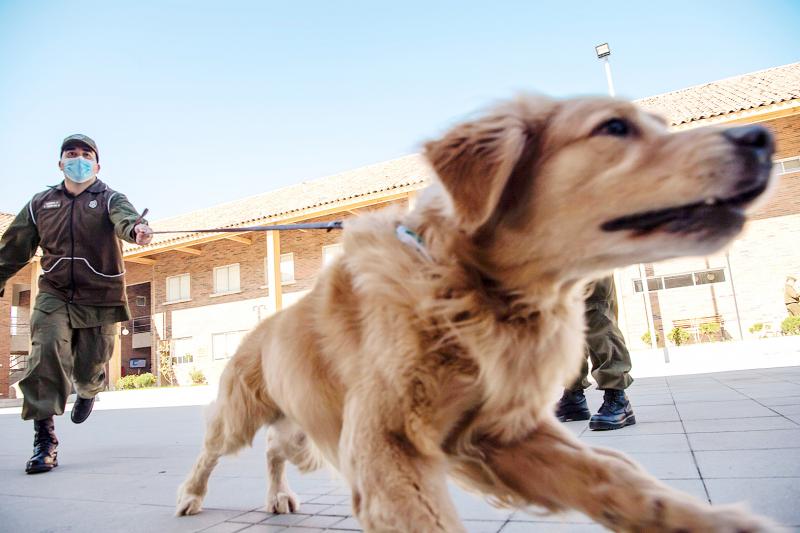Police in Chile are training dogs to detect people that might be infected with COVID-19 by sniffing their sweat.
The dogs — three golden retrievers and a labrador — are between the ages of four and five.
Until now they have been used to sniff out illicit drugs, explosives and lost people, police said.

Photo: AFP
The training program is a joint effort by the national police and specialists at the Universidad Catolica de Chile.
It follows in the footsteps of similar efforts taking place in France and the UK, said Julio Santelices, head of the police school of specialties.
Dogs have 330 million olfactory receptors and an ability to detect smells 50 times better than humans. They can also smell 250 people per hour.
“The virus has no smell, but rather the infection generates metabolic changes,” which in turn leads to the release of a particular type of sweat, “which is what the dog would detect,” said Fernando Mardones, a professor of veterinary epidemology at the university.
Tests in Europe and Dubai shown a 95 percent efficiency rate in canine detection of COVID-19 cases, Santelices said.
The importance of this scientific study is that it would allow dogs to become biodetectors, and detect this type of illness at an early stage,” Santelices said.
Mardones said that there evidence that dogs can detect diseases such as tuberculosis, parasite infections and early stages of cancer.
Canines can detect subtle changes in skin temperature, potentially making them useful in determining if a person has a fever.
The experts hope to have the dogs trained and working in the field by next month. The plan is to deploy them with an officer in pedestrian-heavy areas, such as train stations and airports, and at health control stations.

EUROPEAN FUTURE? Albanian Prime Minister Edi Rama says only he could secure EU membership, but challenges remain in dealing with corruption and a brain drain Albanian Prime Minister Edi Rama seeks to win an unprecedented fourth term, pledging to finally take the country into the EU and turn it into a hot tourist destination with some help from the Trump family. The artist-turned-politician has been pitching Albania as a trendy coastal destination, which has helped to drive up tourism arrivals to a record 11 million last year. US President Donald Trump’s son-in-law, Jared Kushner, also joined in the rush, pledging to invest US$1.4 billion to turn a largely deserted island into a luxurious getaway. Rama is expected to win another term after yesterday’s vote. The vote would

FRAUD ALLEGED: The leader of an opposition alliance made allegations of electoral irregularities and called for a protest in Tirana as European leaders are to meet Albanian Prime Minister Edi Rama’s Socialist Party scored a large victory in parliamentary elections, securing him his fourth term, official results showed late on Tuesday. The Socialist Party won 52.1 percent of the vote on Sunday compared with 34.2 percent for an alliance of opposition parties led by his main rival Sali Berisha, according to results released by the Albanian Central Election Commission. Diaspora votes have yet to be counted, but according to initial results, Rama was also leading there. According to projections, the Socialist Party could have more lawmakers than in 2021 elections. At the time, it won 74 seats in the

CANCER: Jose Mujica earned the moniker ‘world’s poorest president’ for giving away much of his salary and living a simple life on his farm, with his wife and dog Tributes poured in on Tuesday from across Latin America following the death of former Uruguayan president Jose “Pepe” Mujica, an ex-guerrilla fighter revered by the left for his humility and progressive politics. He was 89. Mujica, who spent a dozen years behind bars for revolutionary activity, lost his battle against cancer after announcing in January that the disease had spread and he would stop treatment. “With deep sorrow, we announce the passing of our comrade Pepe Mujica. President, activist, guide and leader. We will miss you greatly, old friend,” Uruguayan President Yamandu Orsi wrote on X. “Pepe, eternal,” a cyclist shouted out minutes later,

Myanmar’s junta chief met Chinese President Xi Jinping (習近平) for the first time since seizing power, state media reported yesterday, the highest-level meeting with a key ally for the internationally sanctioned military leader. Senior General Min Aung Hlaing led a military coup in 2021, overthrowing Myanmar’s brief experiment with democracy and plunging the nation into civil war. In the four years since, his armed forces have battled dozens of ethnic armed groups and rebel militias — some with close links to China — opposed to its rule. The conflict has seen Min Aung Hlaing draw condemnation from rights groups and pursued by the